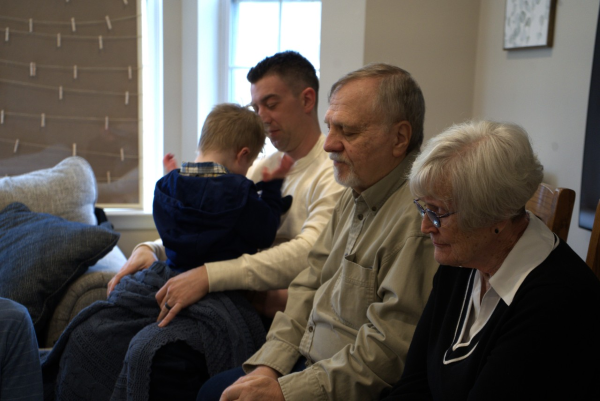This past spring, Calvary Baptist Church in Easton, Pennsylvania, held a celebration service for Table of Life Church, a new church plant led by Calvary’s former student and teaching pastor, Zach McAlack. Even though Table of Life is still in its infancy, everyone at that service heard stories of new life in Christ and transformation.
Yet, these stories would not have been possible without the support of the North American Baptist Conference. When you give to the NAB’s Ministry Resource Fund, you are, in part, helping to provide the necessary resources that allow new churches like Table of Life to exist. Your gifts support trainings, Fit Assessments, and resources that all serve new church plants and churches birthing new congregations.
Give in Canadian Dollars Give in US Dollars
Give in Canadian Dollars
Give in US Dollars
The inception of Table of Life began with conversations amongst the leadership at Calvary. As far back as 2017, Pastor Paul Wilson started talking with the elders about planting. It still took more than five years before things really began to move. “After all,” Paul said, “It was a bit of a paradigm shift.”

In the summer of 2023, Zach approached Pastor Wilson and the elders to share what he said “felt like this really strong call” to plant a church. One of the first things they did was send Zach and his wife, Leah, to the NAB Fit Assessment in February 2024. Fit Assessment is three days of mutual discernment between staff and potential church planters, church revitalizers, and international missionaries to help prepare them for ministry.
Prior to attending Fit Assessment, Zach was eager to get on with planting a church. “In every other situation in my life, it’s just kind of been like, ‘This seems like the obvious thing; let’s just go,’” he said. But at every step, he kept getting yellow lights telling him to slow down. “It’s allowed me to have a really different perspective. I can definitively say God has called me into this.”
As part of the yellow light Zach received from Fit Assessment, it was suggested he complete a residency with another NAB church plant: Disciples Church in Medina, Ohio, led by Pastor Drew Steinhart. Zach and Drew met on video every other week, talking through logistics. Crucially, said Drew, “We also worked hard to pay attention to the way God was at work in Zach’s soul.”
“Drew and I talking deeply about my need to be with Jesus,” Zach said, “and to be shaped by him and be formed by him rather than constantly trying to work my way out and do all those things was, for me, probably the real value of that residency.”
 Table of Life officially launched in May 2025, and because of Calvary’s commitment to planting well, the Fit Assessment helping Zach to see where he needed to grow, the residency with Drew, and other connection points along the way, Zach is learning how to become the person he needs to be for the people who call Table of Life home. And coming out of this young church are stories about new life and transformation. At that celebration service earlier this year, a father shared about his prodigal son’s return to faith, and a high school senior gave her testimony on stage, visible proof of Jesus helping her overcome her crippling anxiety.
Table of Life officially launched in May 2025, and because of Calvary’s commitment to planting well, the Fit Assessment helping Zach to see where he needed to grow, the residency with Drew, and other connection points along the way, Zach is learning how to become the person he needs to be for the people who call Table of Life home. And coming out of this young church are stories about new life and transformation. At that celebration service earlier this year, a father shared about his prodigal son’s return to faith, and a high school senior gave her testimony on stage, visible proof of Jesus helping her overcome her crippling anxiety.
Out of the birth of a new church, new life in Christ is blossoming. Would you support efforts to birth new churches and new life in Christ by supporting the Ministry Resource Fund? Your donation of $50, $100, or more will, in part, help support churches as they send out leaders to birth new communities of faith.
As Pastor Paul at Calvary said, “Anytime a birth happens, it’s a miracle.”
Give in Canadian Dollars Give in US Dollars
Give in Canadian Dollars
Give in US Dollars
You can also text to give. Just text any amount followed by “CHRISTMAS” to:
204.400.2238 (Canada)
916.249.0534 (US)
(204) 400-2238 (Canada)
(916) 249-0534 (US)
Canadians can also give using e-transfer; simply use givecanada@nabconf.org and put “Christmas” in the note field.
Consider asking your church to partner with us in these ministry efforts. Here are some ideas for getting involved:
- Give a personal gift today and encourage your family and friends to do the same.
- Distribute materials at Sunday service or weekly Bible studies, classes, or groups.
- Share one of the videos during Sunday service or on social media.